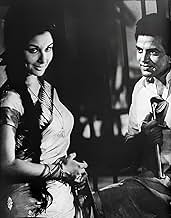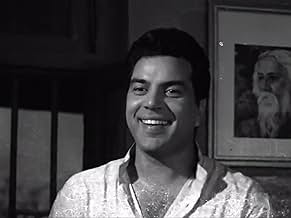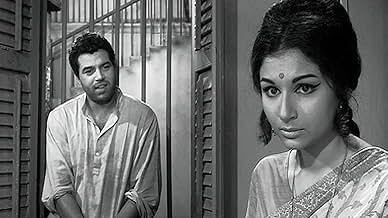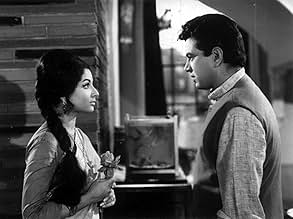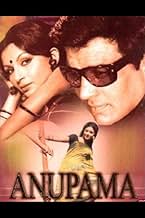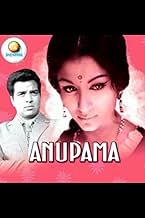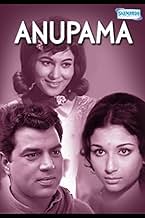Mohan Sharma (Tarun Bose) is a workaholic whose life changes dramatically after his wife dies giving birth to their daughter Uma (Sharmila Tagore). He despises the daughter by day, and adore... Read allMohan Sharma (Tarun Bose) is a workaholic whose life changes dramatically after his wife dies giving birth to their daughter Uma (Sharmila Tagore). He despises the daughter by day, and adores her when drunk at night. Uma's life gets better as she comes of age and has a relationsh... Read allMohan Sharma (Tarun Bose) is a workaholic whose life changes dramatically after his wife dies giving birth to their daughter Uma (Sharmila Tagore). He despises the daughter by day, and adores her when drunk at night. Uma's life gets better as she comes of age and has a relationship with a sensitive poet, Ashok (Dharmendra), who slowly brings her out of her shell.
- Awards
- 1 win & 4 nominations total
- Anita Bakshi 'Annie'
- (as Shashikala)
- Suresh Bakshi
- (as Bharadwaj)
- Moses
- (as David)
Featured reviews
Leela is Gandhari of president times who ignored her sons grave crimes of ditching his wife in marriage and even after divorce, credits all crime of son to Anupama. Leela could accept Kavya , a flower pot, in her family but not Anupama in spite of using her full time 24x7 unpaid maid who can't even ask for self respect.
It's a story highly decorating negative characters like Vanraj , Kavya, Leela and Toshu. All of these are selfish of the highest order. I don't understand what this serial wants to give to the society, a healthy entertainment or a wrong message ?
Hasmukh is another Dhritraashtra or Bhishma of Mahabharat who never took any decision, and rather believed in auto decisions . He could never control his son or wife who continued torturing Anupama for 26 years in marriage and even after divorce. Such persons are more injurious to society.
I personally do not like Glorification of negativity in life .
The serial as far as acting of actor / actresses is doing well but story is Hopeless and unrealistic.
No woman in 2020/21 would like to live with sautan in the same house.
Any disease if not treated in time , like arrogance of Vanraj or Leela or Kavya, is going to become Cancer .
Anuj Kapadia, is doing well and knows how to give check mate to Vanraj and Kavya and lesson to Anupama in a single move.
Hrishikesh Mukherjee's attempt to make "Bimal Roy Cinema" as a tribute. Anupama, widely known as Hrishikesh Mukherjee's one of the Greatest Achievement is sort of Bimal Roy Cinema and to confirm it there is tagline at the beginning, "Dedicated to Bimal da". Anupama has soul connected to a Woman's strained life just like Bimal Roy films had but Hrishi da makes it more of a love story than a social topic. In Anuradha he gives tribute to all Women who have sacrificed their everything to make men successful and so it became universal concept but that's not the case here for Anupama. The film is about a girl whose mother immediately after her birth so the Father blames her for this loss and even the girl starts believing it as her own fault. Then finally sunshine called Love comes into her life and encourages her to Live incomparably. Anupama has many emotional moments where you can't hold your tears, one is when you realise her pain, another one when Dharmendra sings painful poem. In climax it feels like film misses something, don't know what exactly, may be Father-daughter final face off or acknowledgement or maybe social message. Otherwise it is a very good emotional drama keeping all qualities upto the mark. Sharmila Tagore is fantastic in this shy yet full of life role, Dharmendra shines as a poet and a man with principles, Shashikala is in top form in her favourite zone of chatterbox and free minded girl. Dialogues writing is are pure class, i don't see nothing wrong about it rather many dialogues are overwhelming and ahead of time. Hrishikesh Mukherjee's direction is nice, he covered all elements with his intelligence. The shortcomings are unacceptable though. Anupama should have had more appealing social issue and then it would have left stronger impact.
RATING - 7/10*
By - #samthebestest
Although the movie takes its own time to develop the characters thoroughly and although you wouldn't expect anything less from Hrishikesh Mukherjee in that regard, I did feel that the movie could have been shortened a little bit. Also, Shashikala's role seemed a little exaggerated.
In general, the movie is a gem and I wish viewers all over the world could be introduced to such Hindi classics for a true appreciation of the range of "Bollywood" movies over the years.
A poignant film portrayed beautifully and realistically, it is a subtle yet powerful episode made with heart and sincerity. Mukherjee's excellent direction is aided by fantastic cinematography, very pleasant music, and above all, brilliant dialogue which enhances the otherwise serene narrative and helps define the characters. Although some may find the film a tad slow, I found the pacing perfectly balanced. I was engaged by its exquisite authenticity, and its humanistic warmth filled me with positivity. Its graceful simplicity just draws you in. Wavering between slice-of-life social drama and delicate romance, Anupama offers a profound exploration of the human experience and an affecting glimpse into the fragility of relationships. Equally significant is its incisive commentary on the societal norms, gaps, and circumstances of its time.
The film has a great collaborative effort by the ensemble cast. Sharmila Tagore delivers a beautifully restrained performance, and Dharmendra is fantastic as the sensitive poet Ashok. Shashikala is extremely likable and funny and makes her presence felt as the vivacious Anita. Ditto for Deven Verma who plays Arun. David provides great comic relief as Uma's father's kind and humourous friend and his stories throughout the film are hilarious. Tarun Bose is excellent as Uma's father Mohan, and the ever great Durga Khote as Ashok's mother, as well as Naina as his lovely sister, provide great support. The story ends on a staggeringly revelatory and moving note. All in all, I highly recommend this classic to people who like artistic quality films. It might require patience, but it's highly rewarding.
Did you know
- TriviaKuch Dil Ne Kaha Kuch Bhi Nahin. Sharmila Tagore had turned up for the song's shoot in Mahabaleshwar at 5 am in full makeup and with her hair styled in a bouffant. Director Hrishikesh Mukherjee disapproved of the bouffant and told the actress that it didn't go with her character. He gave in when she insisted on keeping it. Later, however, Tagore regretted her appearance in the song and wished that she had listened to the director. [
- ConnectionsFeatured in Guddi (1971)
- SoundtracksYa Dil Ki Suno Duniyawalo
Sung by Hemanta Mukherjee (as Hemant Kumar)
Music composed by Hemanta Mukherjee (as Hemant Kumar)
Lyrics by Kaifi Azmi
- How long is Anupama?Powered by Alexa
Details
- Release date
- Country of origin
- Language
- Also known as
- Incomparable
- Filming locations
- Production company
- See more company credits at IMDbPro
- Runtime
- 2h 28m(148 min)
- Color

